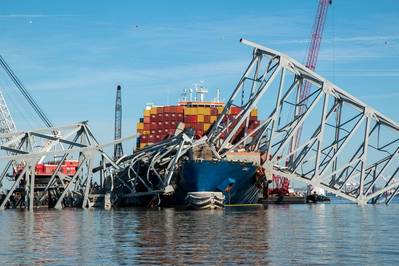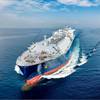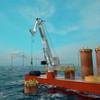Containership Lost Power Several Times Before Striking Bridge in Baltimore
The cargo ship Dali lost electrical power several times before it crashed into the Francis Scott Key Bridge in March, killing six people and paralyzing a major transportation artery for the U.S, Northeast, federal investigators said on Tuesday.
The National Transportation Safety Board (NTSB) said in a preliminary report that about 10 hours before leaving Baltimore the Dali experienced a blackout during in-port maintenance and shortly before the crash.
The board said the cargo ship had other outages including about four minutes before the crash when electrical breakers unexpectedly tripped causing a loss of power to all shipboard lighting and most equipment when it was 0.6 mile (1 km) from the bridge.
The Dali crew restored power, but another blackout occurred 0.2 mile (about 320 meters) from the bridge, which stopped all three steering pumps. The crew was unable to move the rudder to steer.
The NTSB said it "is still investigating the electrical configuration following the first in-port blackout and potential impacts on the events during the accident voyage." The report includes the first published investigative findings since the fully loaded container ship Dali caused the highway bridge to tumble into the Patapsco River. NTSB Chair Jennifer Homendy will testify before a U.S. House committee on Wednesday on the federal response to the collapse.
The report found no issues with the quality of the fuel onboard. In April, the FBI opened a criminal probe into the collapse. Safety investigators recovered the ship's "black box" recorder, which provides data on its position, speed, heading, radar, and bridge audio and radio communications, as well as alarms. The bridge's insurer Chubb CB.BN said this month it was preparing to pay $350 million to the state of Maryland, which could be the first major payout tied to the bridge collapse.
U.S. crews in Baltimore set off controlled explosions on Monday to allow them to remove a portion of the bridge from the bow of the Dali. This will allow salvage crews to haul away the twisted metal wreckage using cranes and barges, the U.S. Army Corps of Engineers said. Crews have opened four temporary channels since the crash, allowing some shipping to resume. The Corps said it aims to restore port access to full capacity by the end of May. Maryland estimates it will cost $1.7 billion to $1.9 billion to rebuild the bridge and anticipates completion by fall 2028.
(Reuters - Reporting by David Shepardson; Editing by Chris Reese and Lisa Shumaker)












